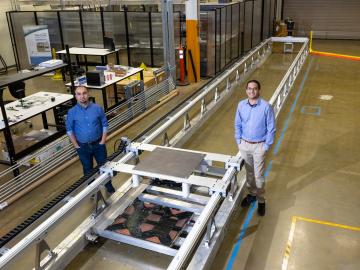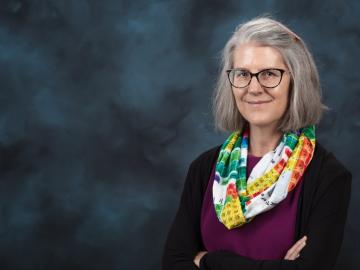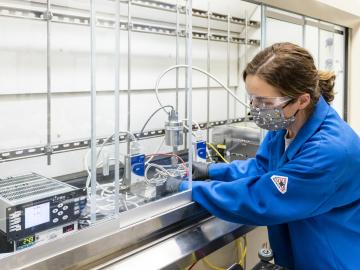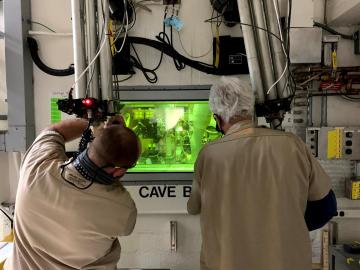
Filter News
Area of Research
- Advanced Manufacturing (2)
- Biology and Environment (28)
- Biology and Soft Matter (1)
- Electricity and Smart Grid (1)
- Energy Science (53)
- Functional Materials for Energy (2)
- Fusion and Fission (11)
- Isotopes (20)
- Materials (62)
- Materials Characterization (1)
- Materials for Computing (10)
- Materials Under Extremes (1)
- National Security (13)
- Neutron Science (22)
- Nuclear Science and Technology (8)
- Quantum information Science (1)
- Supercomputing (22)
News Type
News Topics
- (-) Advanced Reactors (17)
- (-) Chemical Sciences (46)
- (-) Clean Water (16)
- (-) Composites (15)
- (-) Cybersecurity (20)
- (-) Energy Storage (47)
- (-) Isotopes (41)
- (-) Materials Science (75)
- (-) Mathematics (8)
- (-) Nanotechnology (29)
- (-) Space Exploration (14)
- 3-D Printing/Advanced Manufacturing (73)
- Artificial Intelligence (85)
- Big Data (49)
- Bioenergy (74)
- Biology (86)
- Biomedical (46)
- Biotechnology (25)
- Buildings (37)
- Computer Science (127)
- Coronavirus (23)
- Critical Materials (6)
- Education (2)
- Emergency (3)
- Environment (130)
- Exascale Computing (53)
- Fossil Energy (6)
- Frontier (47)
- Fusion (47)
- Grid (35)
- High-Performance Computing (92)
- Hydropower (6)
- Irradiation (1)
- ITER (5)
- Machine Learning (39)
- Materials (82)
- Mercury (7)
- Microelectronics (3)
- Microscopy (31)
- Molten Salt (3)
- National Security (67)
- Neutron Science (95)
- Nuclear Energy (79)
- Partnerships (42)
- Physics (40)
- Polymers (14)
- Quantum Computing (37)
- Quantum Science (52)
- Security (19)
- Simulation (46)
- Software (1)
- Statistics (2)
- Summit (42)
- Transportation (41)
Media Contacts

Consumer buy-in is key to the future of a decarbonized transportation sector in which electric vehicles largely replace today’s conventionally fueled cars and trucks.

Deborah Frincke, one of the nation’s preeminent computer scientists and cybersecurity experts, serves as associate laboratory director of ORNL’s National Security Science Directorate. Credit: Carlos Jones/ORNL, U.S. Dept. of Energy

Sergei Kalinin, a scientist and inventor at the Department of Energy’s Oak Ridge National Laboratory, has been elected a fellow of the Microscopy Society of America professional society.

For years Brenda Smith found fulfillment working with nuclear batteries, a topic she’s been researching as a chemist at Oak Ridge National Laboratory.

At the Department of Energy’s Oak Ridge National Laboratory, scientists use artificial intelligence, or AI, to accelerate the discovery and development of materials for energy and information technologies.

Through a consortium of Department of Energy national laboratories, ORNL scientists are applying their expertise to provide solutions that enable the commercialization of emission-free hydrogen fuel cell technology for heavy-duty

When COVID-19 was declared a pandemic in March 2020, Oak Ridge National Laboratory’s Parans Paranthaman suddenly found himself working from home like millions of others.

A new method developed at Oak Ridge National Laboratory proves one effort’s trash is another’s valuable isotope. One of the byproducts of the lab’s national plutonium-238 production program is promethium-147, a rare isotope used in nuclear batteries and to measure the thickness of materials.

Researchers at the Department of Energy’s Oak Ridge National Laboratory and the University of Tennessee are automating the search for new materials to advance solar energy technologies.

Twenty-seven ORNL researchers Zoomed into 11 middle schools across Tennessee during the annual Engineers Week in February. East Tennessee schools throughout Oak Ridge and Roane, Sevier, Blount and Loudon counties participated, with three West Tennessee schools joining in.


